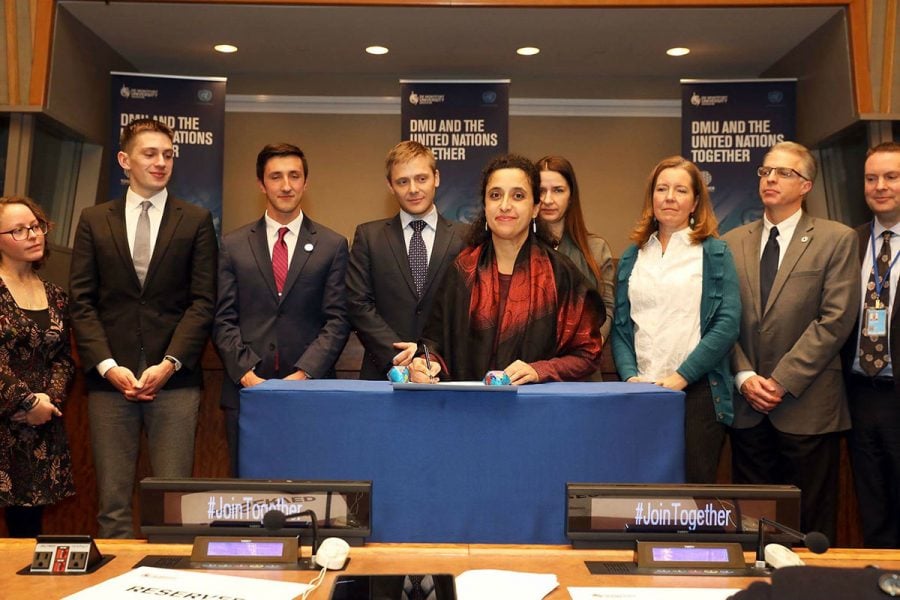Every Campus a Refuge recommended by UN
Diya Abdo signs the UN Together Campaign Action Charter in New York on Tuesday, Jan. 9, 2018// Photo Courtesy of Mark Von Holden
Every Campus a Refuge was represented and recognized by the United Nations at the U.N. Together Campaign Summit in New York on Jan. 9.
The event sought to promote refugee resettlement efforts and the alleviation of problems that refugees face, specifically in a college setting. 10 colleges and universities, including Guilford, attended the summit.
Diya Abdo, the founder of ECAR and associate professor of English, spoke on a panel at the event.
“The Together Campaign itself is a perfect match for our efforts since its focus is engaging higher education in increasing respect and support for refugees’ and migrants’ safety and dignity,” wrote Abdo in an email interview with The Guilfordian. “I was even more thrilled when I found out that the United Nations Department of Public Information had specifically recommended Every Campus A Refuge.”
Since January 2016, ECAR has hosted 32 refugees from African and Middle Eastern families.
According to the ECAR website, “The idea is that university and college campuses have everything necessary – housing, food, care, skills – to take in refugees and support them as they begin their lives in their new homes.”
Krista Craven, assistant professor of justice and policy studies and an ECAR delegate, believes that Abdo promoted this message while at the summit.
“(Abdo) was truly the star of the conference,” wrote Craven in an email interview. “Her message of campuses needing to engage in radical hospitality seemed to resonate in a profound way with other delegates and conference attendees, which was incredible to see.”
Craven presented research on ECAR while at the summit.
“We have been studying the efficacy of ECAR for almost two years now,” wrote Craven in an email interview. “We shared the design of the study and some preliminary findings with other interested delegates at the conference.”
At the conclusion of the panel, representatives from the universities and colleges in attendance signed the U.N. Action Charter.
“It had a certain level of gravity and solemnity that was both humbling and energizing,” wrote Abdo in an email interview. “But I appreciated the physical manifestation of pledging support to refugees and migrants.”
Although the summit had many participants, due to poor weather conditions, many of those invited could not attend. According to Hali Kohls, the ECAR program coordinator, of the people able to attend the summit, there was not much diversity.
“There was a lot of white representation even though we were dealing with an issue that disproportionately affects people of color,” said Kohls. “It was a reminder of who we need at the table, and that we need to have a bigger table probably. It needs to grow.”
ECAR has been adopted by six colleges and universities aside from Guilford, and the organization wants to continue to spread to other institutions. Being recognized by the U.N. was a step in their goal to gain more international attention.
“Given the U.S.’s current policies, ECAR needs to spread to countries and regions where refugees are located and are still welcome,” wrote Abdo in an email interview.
The summit provided networking opportunities between organizations and colleges, promoting collaboration between groups.
“Connecting these people, who may be small entities in their communities and finding ways that they can support each other so they can spread, felt like a kind of grassroots effort,” said Kohls. “This was a good way to get us on the map.”









